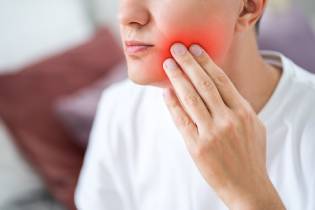Toothache Causes, Symptoms, and Triggers

Walking around with a sore mouth is no fun, and toothaches can prove exhausting. But what causes a toothache, and how can you get rid of them? Read more about the causes of tooth pain and the symptoms associated with a toothache, plus the steps you can take to lessen pain.
What Causes a Toothache?
Toothaches occur when the nerves in your teeth become irritated and the central portion of the tooth, called the pulp, is irritated, causing tooth pain. There are a number of causes for a toothache.
Dental injuries, infections or tooth removal can cause tooth pain and result in toothaches. Cavities and enamel erosion can also create a toothache, as can exposure to extreme heat or cold. Additionally, you might experience a toothache if you accidentally chomped too hard on a popcorn kernel or feel a tooth pain after eating ice cream or taking a swig of your morning cup of hot coffee.
Toothache pain can be mild or fleeting. It can also turn severe and more persistent. If your tooth pain will not go away, you should check in with your dentist.

What Foods Can Lead to Tooth Pain?
The foods and beverages you eat or drink can put your enamel at risk and lead to increased sensitivity and tooth pain. Be wary of the following:
- Citrus Fruits: Lemons, oranges, limes and other citrus fruits are highly acidic, which might heighten tooth sensitivity and lead to soreness.
- White Bread: Yes, it’s soft, but white bread also has refined carbohydrates that can get trapped between your teeth and lead to enamel erosion.
- Soda: Like citrus fruits, soda is acidic. It’s also sugary and can lead to tooth staining and cavities as well as tooth sensitivity and pain.
- Ice and Hard Candy: Chewing on ice can crack cavity fillings and chip teeth, as can hard candy. Moreover, the sugar in candy might make you more susceptible to a cavity and a toothache.
- Alcohol, Juice and Coffee: These beverages have a high level of acidity that may wear away at enamel and ultimately expose the dentin layer, which might cause sensitivity and toothache pain.
Other Reasons Why Your Teeth Might Hurt
While food, dental injuries and cavities might be the most prevalent tooth pain causes, it’s also possible you are experiencing toothache pain if you grind your teeth when you sleep or still have your wisdom teeth.
Stress can cause you to grind teeth at night when you snooze. Sleep disorders and bite issues (notably overbites) can also cause issues in this regard. Grinding your teeth can cause cracking or enamel erosion, which may then cause tooth pain. If your wisdom teeth are pushing through your gums, that might also cause a toothache that may cause your other teeth or jaw to hurt, as well. Consult your dentist if you believe that your wisdom teeth are at the “root” of your tooth pain.
What Are the Symptoms of a Toothache?
Tooth and jaw pain are the most common complaints associated with a toothache. Your teeth might feel especially reactive and painful when you bite, chew or drink something hot or cold.
Tooth pain can last more than 15 seconds after encountering a trigger, which might include pressure to your teeth.
Tooth pain can be rather dull or subdued initially but it can get worse when inflammation increases. Toothache pain can extend beyond your teeth or jaws to your cheeks.
Here are some other toothache symptoms to look for:
- Tooth or jaw pain when chewing
- Headaches
- Tooth sensitivity to hot or cold
- Bleeding or discharge from teeth or gums
- Bad breath
- Bad taste in your mouth
- Swelling around tooth or at jawline
- Swollen glands
If you are experiencing multiple toothache symptoms, it might be an indicator of dental decay, cracked teeth or gum disease. If you recently had a cavity filled, you might also check the status of the filling(s). You can try tapping your teeth to see how they respond to pressure. If you experience pain, the tooth might be infected, even if it appears perfectly normal.
How Do You Know if Your Tooth Pain is Serious?
If you have a toothache lasting more than 1-2 days, you should consult a dentist. The same can be said if it hurts to open your mouth wide. You may have an unknown dental injury or infected tooth.
Will Tooth Pain Go Away on Its Own?
Toothaches stemming from pain around your teeth may go away on their own with anti-inflammatories like ibuprofen or using topical anesthetic, like Orajel™ Medicated for Toothache & Gum Liquid. Minor gum pain may also resolve itself within a couple days. However, pain within the tooth or any sort of infection will require medical assistance.
If your pain does not go away within 2 days, reach out to your dentist.
Should You Brush Your Teeth if You Have a Toothache?
You absolutely must continue to brush your teeth if you have a toothache. Although it might feel uncomfortable, brushing helps to reduce bacteria buildup on your teeth and in your mouth, which might make your toothache even worse or lead to an infection.
It should be noted that brushing alone will not remedy a toothache. Additionally, brushing and flossing are vital measures to take in toothache prevention.

How Do You Get Rid of a Toothache?
More severe toothaches from infection or injury, or aches lasting longer than 2 days, will require medical treatment to get rid of a toothache. However, for more minor toothaches, you can try some of the following remedies for quick relief:
- Saltwater rinse: Mixing ½ teaspoon salt into a glass of warm water can act as a mouthwash that can help reduce inflammation and treat oral wounds.
- Hydrogen peroxide rinse: Use equal parts 3-percent hydrogen and peroxide and water to make a mouthwash. Hydrogen peroxide can help kill bacteria in your mouth while reducing plaque and assisting with bleeding gums.
- Garlic cloves: Garlic can kill bacteria and relieve pain. You can either choose to slowly chew a clove of fresh garlic or, if chewing proves painful, crush the clove to create a paste, which you would then apply to your teeth.
- Antiseptic mouth rinses: Orajel™ offers rinses that can promote the healing of tooth irritation (not to mention, cheek bites and canker sores) when you’re feeling sore.
- Anti-inflammatories: Taking aspirin, ibuprofen, naproxen or acetaminophen can help reduce pain and inflammation.
- Topical anesthetics: Orajel™ products containing Benzocaine may be applied directly to the source of the tooth pain to help with fast relief.
Does Orajel™ Work for Tooth Pain?
Orajel™ has a combination of gels, creams and rinses that can help temporarily relieve toothache pain. Try the following products whenever you’re experiencing minor tooth pain and are looking to get rid of that toothache pain fast:
Kick Toothache Pain to the Curb with Orajel™
Don’t let toothache pain keep you down. Look to Orajel™ whenever you’re experiencing tooth or mouth discomfort and looking for fast relief. You’ll turn that frown upside down in no time.